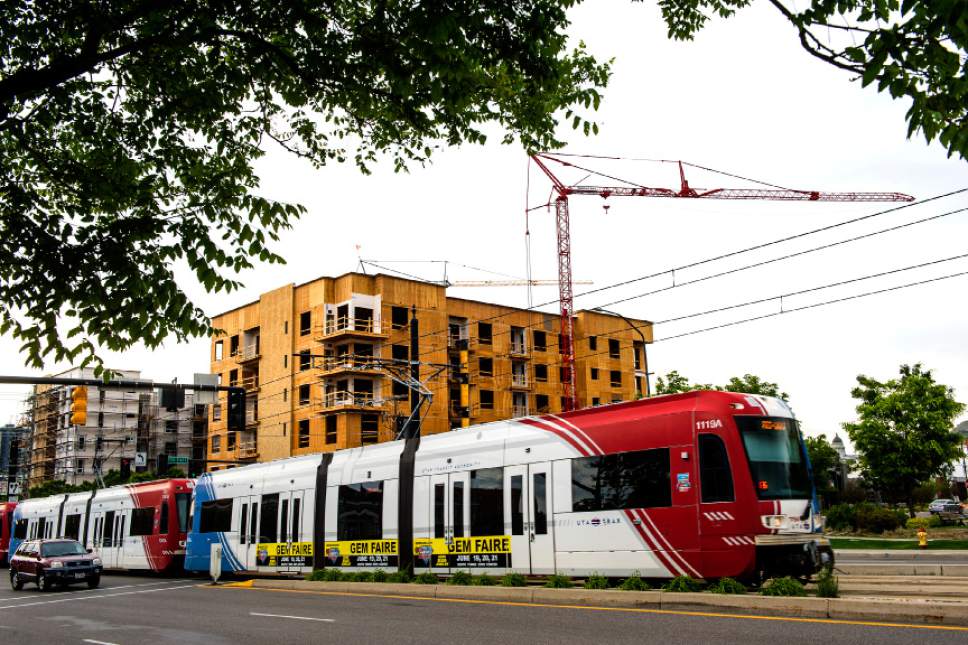This is an archived article that was published on sltrib.com in 2017, and information in the article may be outdated. It is provided only for personal research purposes and may not be reprinted.
A new state transportation task force was launched Tuesday, seeking how to finance billions of dollars needed for future projects — and how best to govern transportation agencies, including the controversial Utah Transit Authority.
The Transportation Governance and Funding Task Force faces some daunting challenges, including UTA reporting that it lacks sufficient funds for now-planned transit projects — and big tax increases may be needed to pursue them.
Also, the task force heard that booming population growth likely will exceed the state's capacity to handle transportation needs in traditional ways, so transit and newer live-and-work-in-the-same-area developments may become more important.
"We're going to double our population in 35 years. And we are not going to be able to double our road miles" in the tight geography of mountain valleys, warned Carlos Braceras, executive director of the Utah Department of Transportation.
The new task force was formed by legislation this year to study such issues over the next eight months, with members appointed from the Legislature, businesses, cities, and counties.
Sen. Wayne Harper, R-Taylorsville, wrote the legislation and was appointed co-chairman of the task force. He said it seeks to "create a system of transportation coordination, funding, governance and mobility for our state for the next 20 to 40 years — a pretty challenging task."
He said it will look at ways to possibly eliminate funding silos now separating money for transit, roads, airports and other projects. "We need to figure out a better way to prioritize projects and get funding into the most important parts."
Rep. Mike Schultz, R-Hooper, the other co-chairman, said tight funding complicates the task. For example, in the early '90s, he said, gasoline tax revenue covered about 90 percent of state road funds. "Today it only covers 50 percent," he said, because it has not kept up with inflation.
Schultz added, "Transit is going to be a key mode" to handle expected rapid population growth and, "we heed to look at how to fund transit going into the future."
That may be tough because UTA President and CEO Jerry Benson said earlier this month that the many extensions of TRAX, FrontRunner and bus rapid transit projects now in long-range regional plans cannot be funded with current resources.
He said those plans assumed Utah would have a penny per dollar sales tax for transit by now. It is far less — 0.69 cents per dollar in Salt Lake County, for example. Raising it to a full penny per dollar would require a 45 percent tax increase.
UTA Board Chairman Robert McKinley told the task force that his agency knows recent scandals have damaged public trust, which in turn hampers its ability to seek tax increases. He promised that UTA is changing.
"Today, Utah has evolved into a much different, much improved organization than it was just three years ago," he said, when state audits complained about high executive pay, sweetheart deals with developers and extensive travel — which led to an ongoing federal investigation, and appointment of a federal monitor over UTA operations.
The agency has "implemented dozens of reforms since 2014 to resolve these past problems," McKinley said. Still, "I acknowledge we have a long road ahead of us to rebuild public trust. We're committed to do that."
Harper said, "I think there will be a lot of discussion about UTA and how it is governed and how it is operated."
His original legislation had proposed changes in how UTA board members are appointed, including requiring confirmation by the state Senate.
Harper said the task force's next meeting on June 14 will look at how transit and other agencies are governed in other states. The rest of that meeting will allow "anybody who wants to talk about the future of transportation in Utah [to] come in and give us their input," and he expects a marathon-length meeting.



